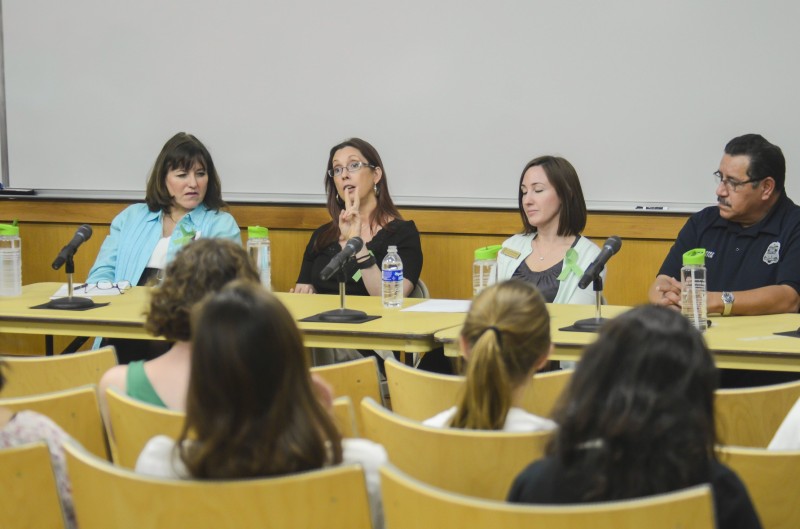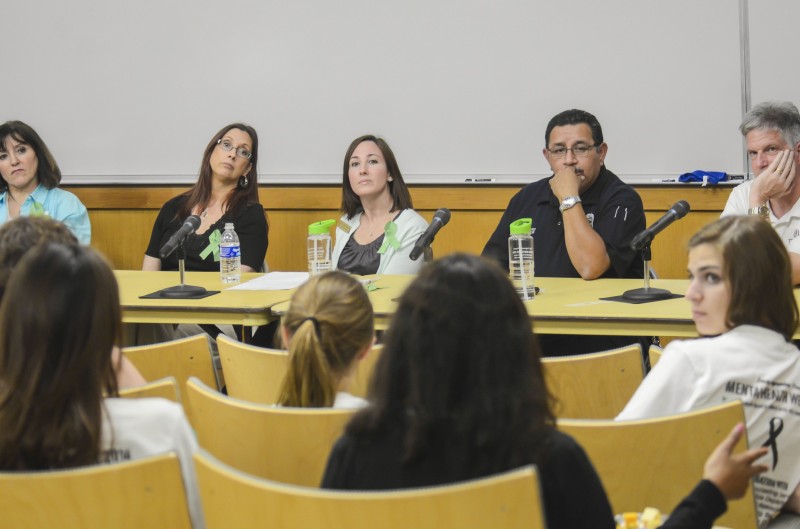As part of Mental Health Week, Trinity Progressives hosted a Mental Health Forum Thursday, April 17, where students came and asked a panel consisting of David Tuttle, dean of students and vice president for student affairs, Kristin E. Eisenhauer, senior psychologist; Carolyn Black Becker, psychology professor; Sheryl Tynes, associate vice president for academic affairs, professor, sociology and anthropology; and Pete Perez Jr., assistant chief of police.
The forum was conducted by Gary W. Neal, director of counseling and health services.
Students inquired about resources available and academic and financial policies in the event of a mental health crisis.
Free t-shirts and water bottles containing additional information were available to those who attended the event. The forum covered topics like depression, anxiety, panic attacks and how to reach out to a friend struggling with their mental health.
“Anxiety disorders, panic, OCD, mood disorder, attention deficit, substance abuse and eating disorders are probably the most common issues that students struggle with,” said Kristin Eisenhauer.
The stress of being in college and juggling several activities contributes to the anxiety that many college students go through. Seeking help when feelings of anxiety become frequent or overwhelming is highly advised.
“Anxiety is one of those things we all experience from time to time, so you don’t have to have a full-blown anxiety disorder. If you’re struggling with anxiety to the point of it affecting your social relationships, your school work, your student job, then you might want to pop in and see someone from counseling services,” Eisenhauer said.
The panel was asked about a scenario when a student’s mental health begins to interfere with their academic performance and their overall well-being.
“Sooner is better than later, and it’s ideal if you are the one to reach out to them. if you feel that you are struggling and you need help, send a note to all your professors and let them know. If you feel like you’re unable to do that, reaching out to somebody else on campus, myself included, to send a note to faculty,” Tynes said.
Students have options if their academic performance has suffered due to struggling with their mental health. Some of those options include financial compensation.
“When a student has to withdraw from everything, one of the things I like that we do is Trinity puts on your annual tuition bill a tuition refund plan. It’s $176 this year. It is put on your bills in July, and we do it automatically. If you had a roommate that had to withdraw from everything because of mental health issues, that student can file for tuition insurance, and if it’s mental health, they can get back 60 percent of their out-of-pocket tuition,” Tynes said.
Another option for students is to take an incomplete in a course, which is a temporary grade that gives them time to finish out the class assignments at a later date.
“Its a good way to focus your energy and do as well as you can in some classes and stall, as it were, buy time for other classes,” Neal said.
There are steps students can take when they notice a friend, roommate or suitemate expressing suicidal or self-harm tendencies. Counseling services is a resource available for students use.
“It could be really powerful to agree to go to with somebody to counseling services. One of the things they can do is relieve some of the pressure,” said Black Becker.
Depression is not something that goes away quickly. Improvements in a person’s mental health take time and depend on the support of those around them.
“Know this is not a one-time conversation. Just because you talk to them about their suicidal thoughts once doesn’t mean that you’re off the hook and you never have to talk about that again. It’s important to continue to check in.








